NEW: I’m not sure people fully appreciate how dire the US life expectancy / mortality situation has got.
My column:
And some utterly damning charts.
1) at *every* point on the income distribution, Americans live shorter lives than the English. https://t.co/pOoziEK5mZenterprise-sharing.ft.com/redeem/75e5e3d…

My column:
And some utterly damning charts.
1) at *every* point on the income distribution, Americans live shorter lives than the English. https://t.co/pOoziEK5mZenterprise-sharing.ft.com/redeem/75e5e3d…
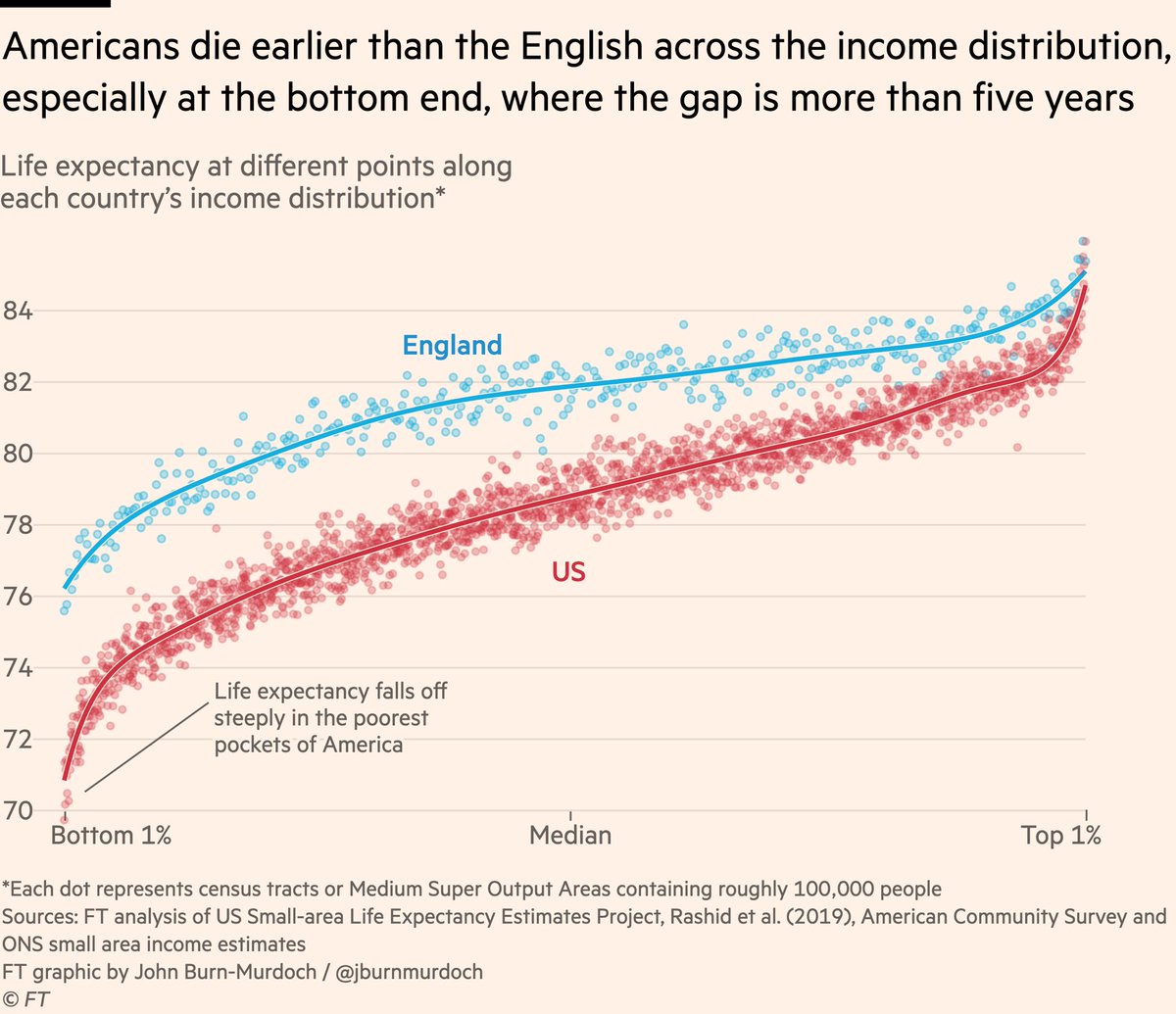
2) It’s actually worse than that chart made out, because at most points on the income distribution, Americans earn much more than Brits.
If we plot the same data by actual income instead of percentile, the US deficit is vast.
5 fewer years even among the comfortably-off.
If we plot the same data by actual income instead of percentile, the US deficit is vast.
5 fewer years even among the comfortably-off.
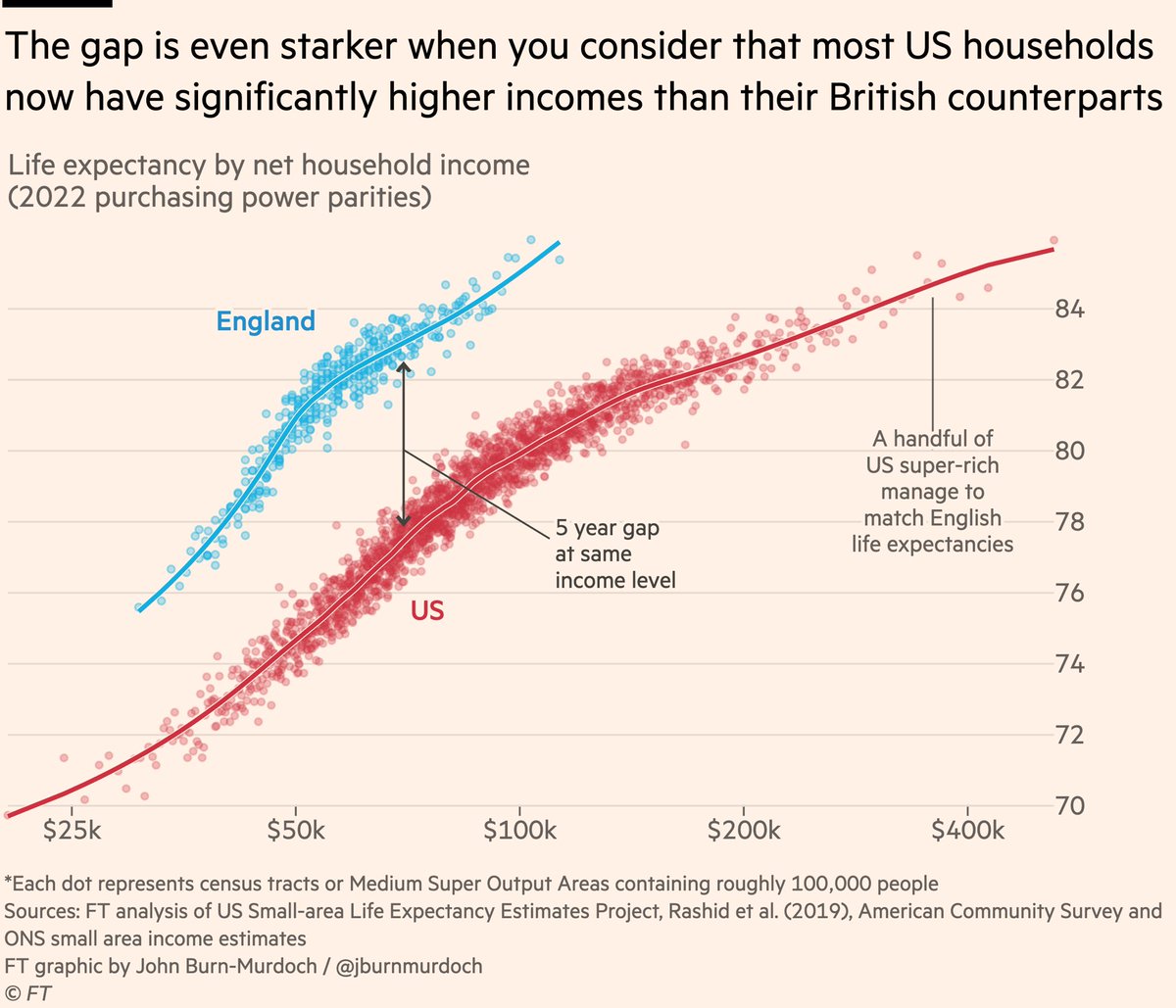
Things have deteriorated so much that the average American now has the same healthy life expectancy (years lived in good health) as someone in Blackpool, the town with England’s lowest life expectancy (by far), synonymous with deep-rooted social decline ft.com/blackpool 
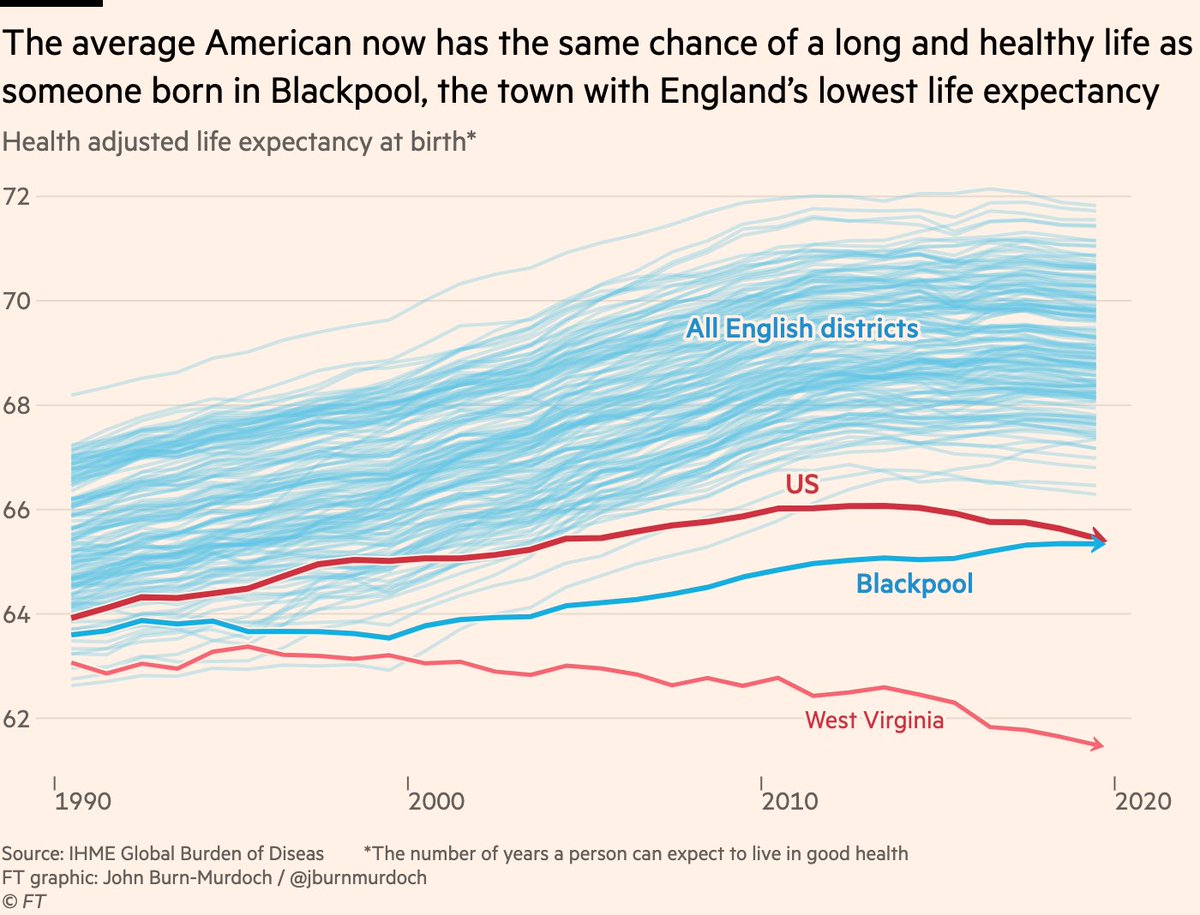
I think that bears repeating. *The average American* has the same chance of a long and healthy life as someone born in the most deprived part of England, a place with the highest rates of relationship breakdown and some of the highest rates of antidepressant prescribing.
So what’s happening?
When people hear about life expectancy they often think about older people, broad-based health problems, but the US problem is quite specific and quite different: it’s young people dying from external causes.
When people hear about life expectancy they often think about older people, broad-based health problems, but the US problem is quite specific and quite different: it’s young people dying from external causes.
Time for perhaps the most damning stat of all:
One in 25 American five-year-olds today will not make it to their 40th birthday.
No parent should ever have to bury their child, but on average across the US one set of parents from every kindergarten class most likely will.
One in 25 American five-year-olds today will not make it to their 40th birthday.
No parent should ever have to bury their child, but on average across the US one set of parents from every kindergarten class most likely will.
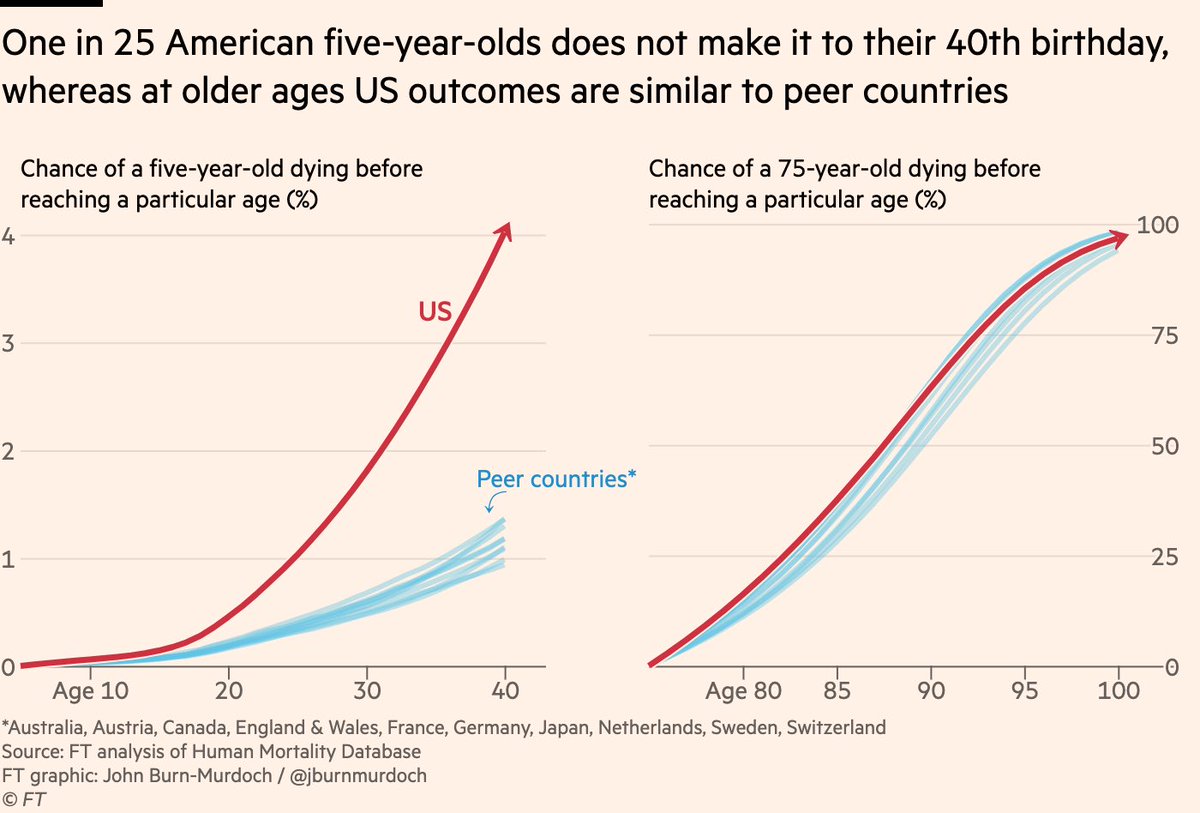
Here’s another way of showing the same thing:
Beyond age 70, US mortality/survival rates are very similar to other rich countries. But between teenage years and early middle age there is a vast gulf.
Beyond age 70, US mortality/survival rates are very similar to other rich countries. But between teenage years and early middle age there is a vast gulf.
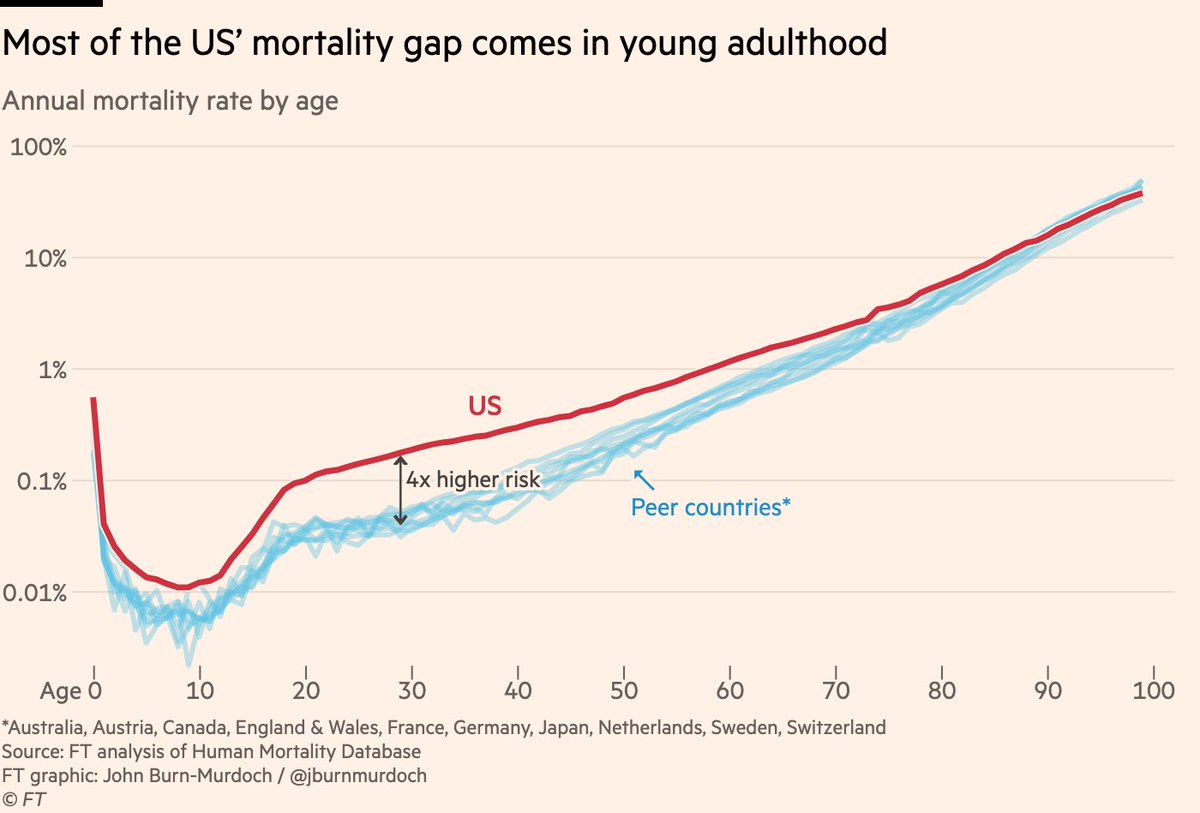
This has an outsized impact on life exp because deaths at early ages erase far more life than even a large number of older folks dying slightly early.
More years of American lives were erased by drugs, guns & road deaths in 2021 alone than from Covid during the whole pandemic.
More years of American lives were erased by drugs, guns & road deaths in 2021 alone than from Covid during the whole pandemic.
The result is that the US is the only developed country where even if you strip out all Covid deaths, life expectancy still dropped by a year since 2019 
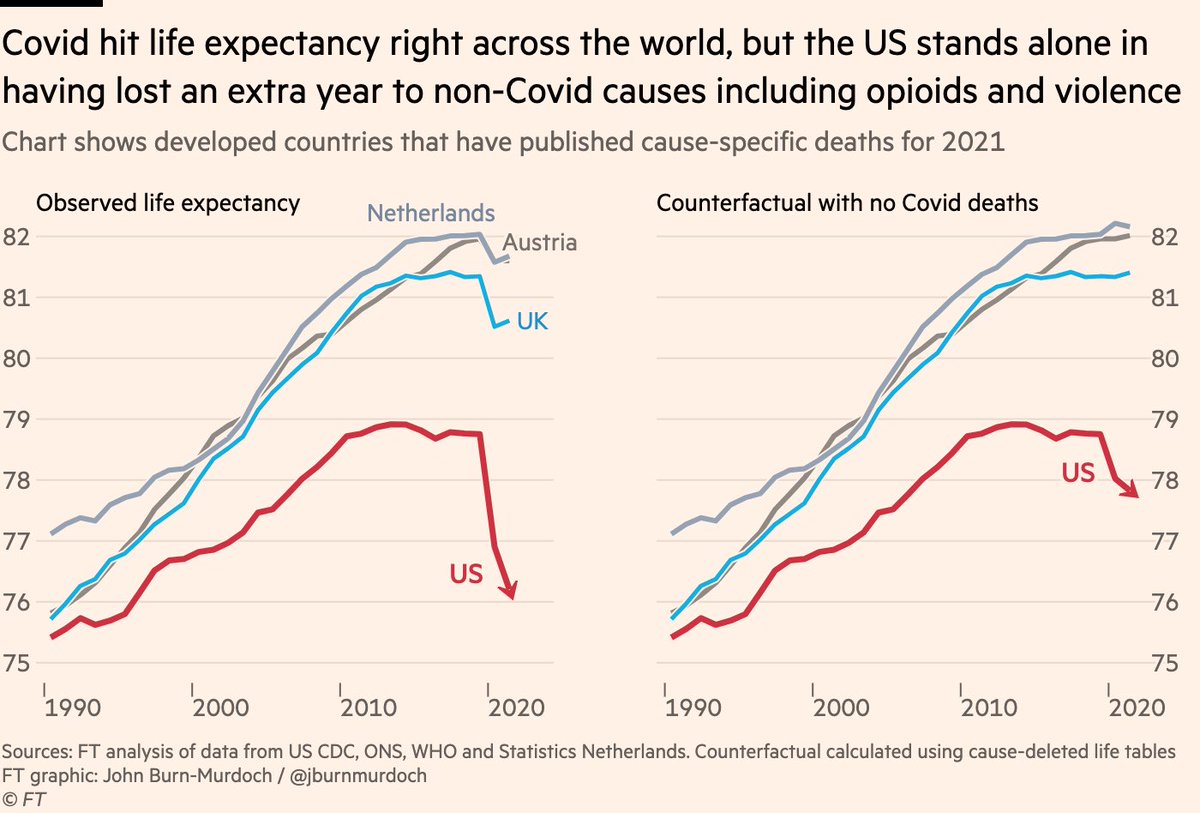
So we have a steady climb in “deaths of despair” and other violent/external deaths, plus the heavy toll exacted by very high rates of diet-related disease (cardiovascular diseases etc).
Why is the US so badly afflicted?
Why is the US so badly afflicted?
One strong possibility is because the US is the ultimate “individual responsibility” country. Every person for themselves, weaker social safety nets.
So, far more people slip through the cracks and find themselves in situations that make obesity, violence and drugs more likely.
So, far more people slip through the cracks and find themselves in situations that make obesity, violence and drugs more likely.
Plus (directly related): huge emphasis on personal freedoms means more guns, more dangerous/unsafe driving, more lethal vehicles than similarly developed countries.
So a perfect storm of 1) more people pushed into bad situations, 2) easier for bad situations to become deadly.
So a perfect storm of 1) more people pushed into bad situations, 2) easier for bad situations to become deadly.
Wider inequalities don’t help.
Look back at the first charts: despite being a richer society on average, the poorest in the US are even poorer than the poorest English.
That’s taking the society-wide US disadvantage and multiplying it.
Look back at the first charts: despite being a richer society on average, the poorest in the US are even poorer than the poorest English.
That’s taking the society-wide US disadvantage and multiplying it.
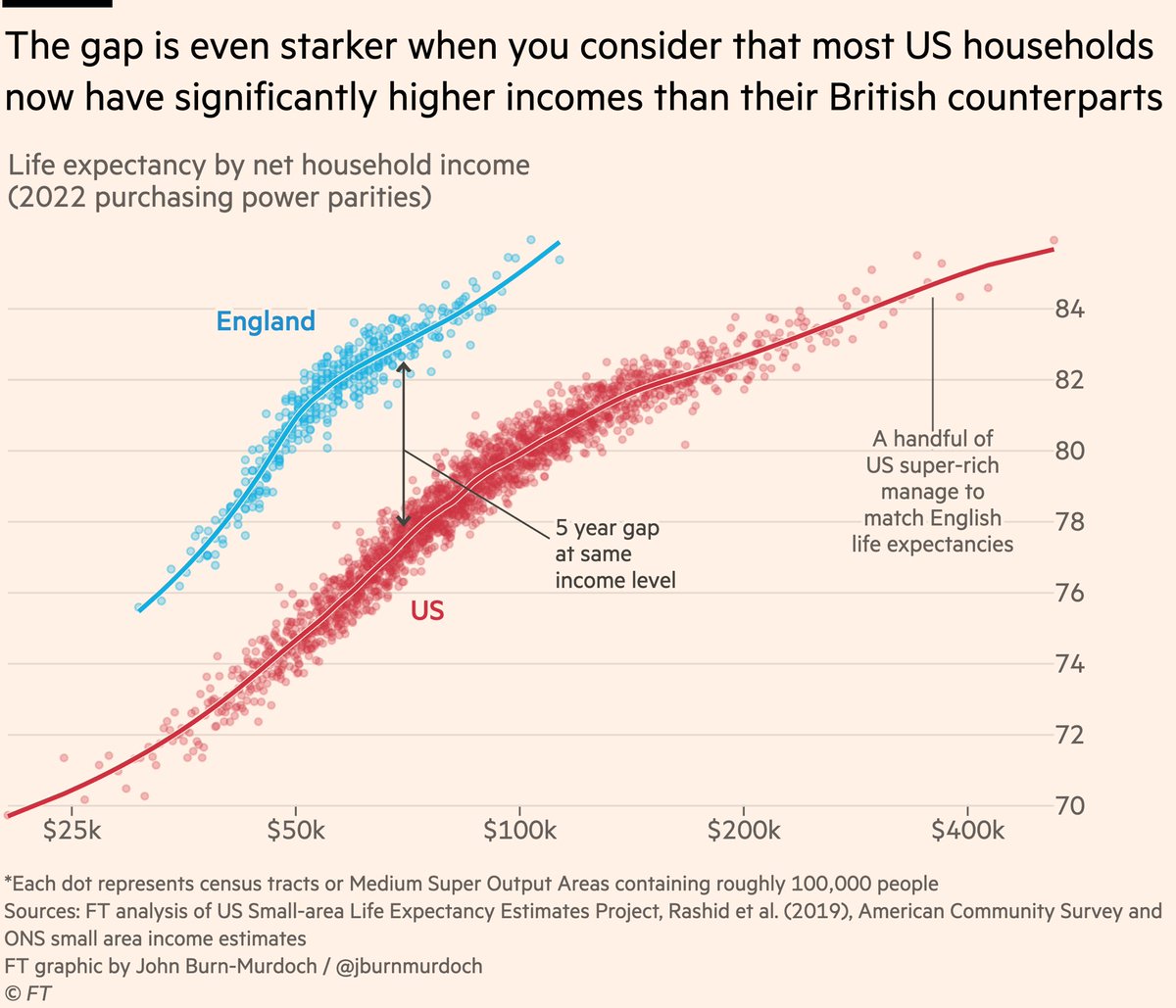
Worse access to healthcare will certainly be playing a part too, but the types and ages of deaths suggest the US’s life expectancy problem is as much (if not more) a social problem than a health problem in terms of the way we should think about it.
To put it another way: it’s certainly true that being unable to access/afford healthcare costs American lives, but the bigger problem is that Americans require so much more healthcare (due to poor diet), and tens of thousands are killed without healthcare even being a factor.
This makes solutions harder, too.
With health challenges — cancer for example — the whole of society is pulling together. Everyone wants to fix this. As a result cancer survival rates have got better and better, and the US does very well on this.
With health challenges — cancer for example — the whole of society is pulling together. Everyone wants to fix this. As a result cancer survival rates have got better and better, and the US does very well on this.
But guns, drugs, obesity, road deaths etc are a) fundamentally caused by social problems not health problems, and b) often involve competing interests.
In the unfortunate reality we live in, fixing them is much harder.
In the unfortunate reality we live in, fixing them is much harder.
One misconception I also want to address: the dreadful US performance does not disappear if you “adjust for race”.
This is way way overstated.
This is way way overstated.
The pockets of both countries where life expectancy has been falling are overwhelmingly white [working class], and the most diverse parts have seen the biggest increases.
Contrast diverse (and hardly affluent) inner-city London Newham with Middlesbrough, Boston, Lincoln.
Contrast diverse (and hardly affluent) inner-city London Newham with Middlesbrough, Boston, Lincoln.
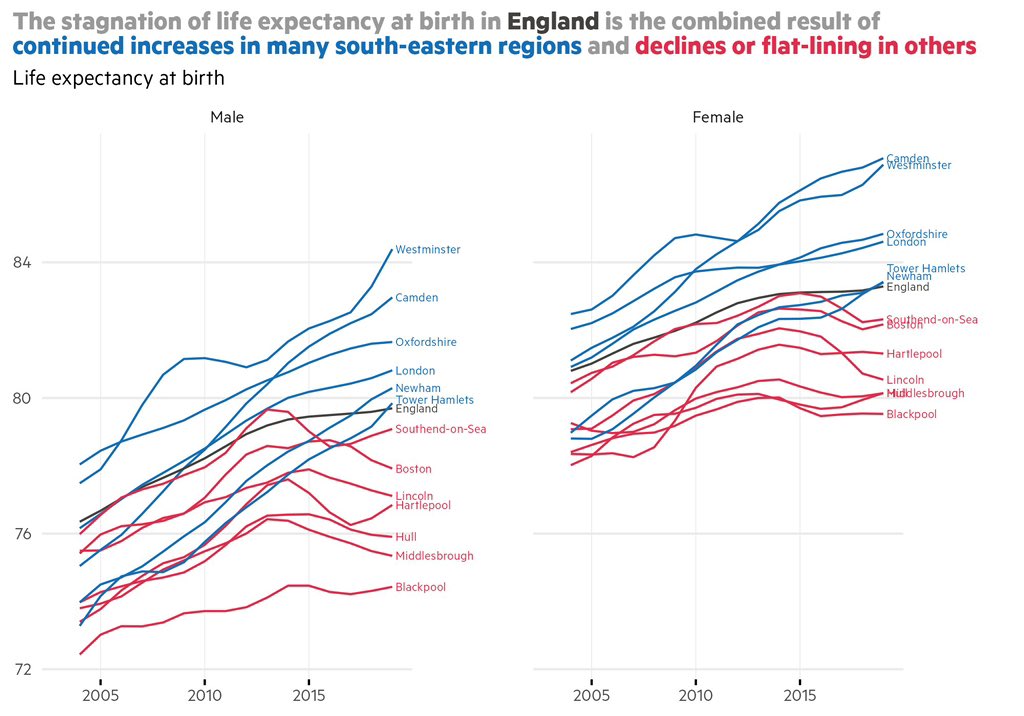
Here’s the column again enterprise-sharing.ft.com/redeem/90df7e6…
And here’s a piece I did last year looking at how the US’s life expectancy deficit would look if drugs, guns, road deaths or obesity could be magicked away
enterprise-sharing.ft.com/redeem/39e212e…
enterprise-sharing.ft.com/redeem/39e212e…
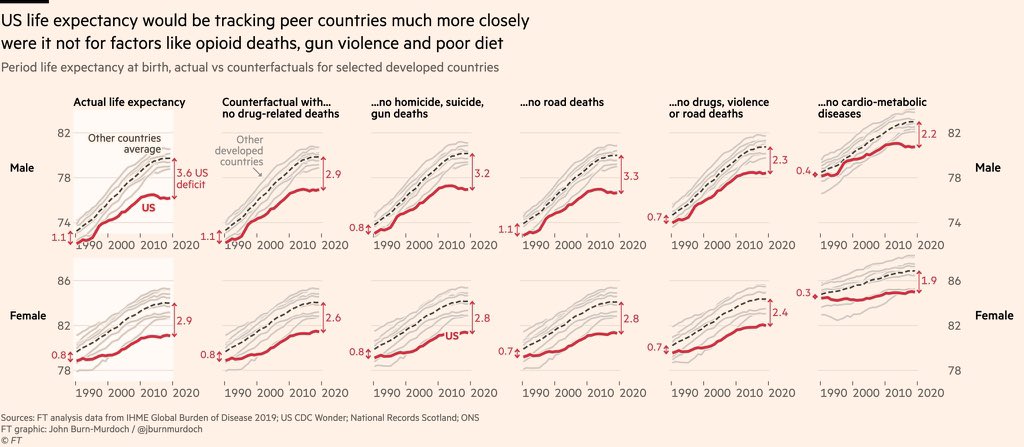
A belated but important footnote to this thread:
Big thank you to @meepbobeep and @VictimOfMaths for being my actuary/demography/methodology sounding boards for this piece.
Unfortunately it’s been a big few years for journalists thanking actuaries 🙃
Big thank you to @meepbobeep and @VictimOfMaths for being my actuary/demography/methodology sounding boards for this piece.
Unfortunately it’s been a big few years for journalists thanking actuaries 🙃
Colin @VictimOfMaths has done brilliant work on the same topic here
https://twitter.com/VictimOfMaths/status/1630529980424650753
And Mary Pat @meepbobeep regularly shares invaluable deep-dives like this one
https://twitter.com/meepbobeep/status/1638587327885844494
• • •
Missing some Tweet in this thread? You can try to
force a refresh















